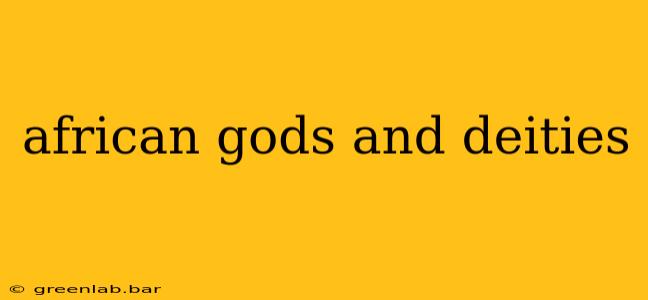Africa, a continent rich in history and culture, boasts a diverse tapestry of religious beliefs. While many Africans today identify with Christianity or Islam, the indigenous belief systems and the pantheon of gods and deities they venerate remain a vibrant and significant part of the continent's heritage. It's crucial to understand that there is no single "African religion" or unified pantheon. Instead, diverse belief systems, with their own unique gods and goddesses, exist across numerous ethnic groups and regions. This exploration will offer a glimpse into some prominent figures and overarching themes found in these rich traditions.
Understanding the Complexity of African Religious Systems
Before delving into specific deities, it's important to grasp the fundamental differences between African traditional religions and those of other cultures. Often, these systems are animistic, believing that spirits inhabit both living beings and inanimate objects. Ancestor veneration is also central, with deceased relatives believed to act as intermediaries between the living and the spirit world. The concept of a supreme being, often seen as a creator god, is common, though the specifics of this being's role and interaction with the world vary widely.
Unlike many Western religions with highly structured hierarchies, African religious practices often involve a more fluid relationship with the divine. Deities may be associated with specific natural phenomena, aspects of human life, or social roles. Their power and influence are often understood in a localized context, meaning their effects are most strongly felt within a specific community or region.
Prominent Deities and Their Roles
It's impossible to list every deity from every African culture in a single article. Instead, let's examine a few notable examples to illustrate the diversity and complexity of the pantheons:
1. Olorun (Yoruba, West Africa): Often considered the supreme creator god of the Yoruba people, Olorun is a distant, transcendent figure. While not directly involved in daily affairs, Olorun is the ultimate source of power and authority.
2. Anansi (Ashanti, West Africa): This trickster god, often depicted as a spider, is a prominent figure in Ashanti folklore. Anansi's stories teach valuable lessons about cleverness, resourcefulness, and the consequences of one's actions. He is not purely benevolent, but his actions often contribute to the overall balance of the world.
3. Maat (Ancient Egypt): In Ancient Egyptian mythology, Maat represents truth, justice, balance, and cosmic order. She is not a deity in the typical sense but rather a fundamental principle that governs the universe and human behavior. Maintaining Maat was essential for the well-being of both individuals and society.
4. Mami Wata (Various West and Central African traditions): A water spirit or goddess, Mami Wata, is often depicted as a beautiful woman with aquatic attributes. She is associated with both fertility and danger, embodying the power and mystery of water. Her worship varies considerably across different cultures.
5. Unkulunkulu (Zulu, Southern Africa): This Zulu creator god is seen as the origin of all things. Although a supreme being, Unkulunkulu is not typically worshipped directly but rather through ancestors and other spirits.
The Importance of Context and Respect
It's crucial to approach the study of African gods and deities with sensitivity and respect. These are living traditions, deeply intertwined with the cultural identity and spiritual practices of millions of people. Avoid reductive interpretations or generalizations, and recognize the immense diversity that exists across the continent. Further research into the specific traditions of particular ethnic groups is strongly recommended for a deeper understanding. This brief overview serves only as an introduction to the fascinating and complex world of African religious beliefs.

